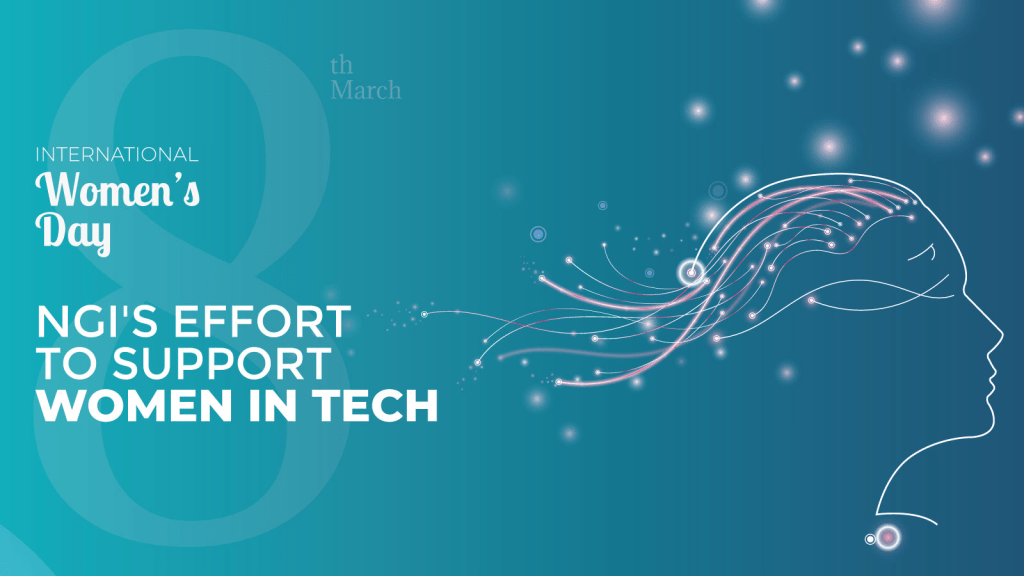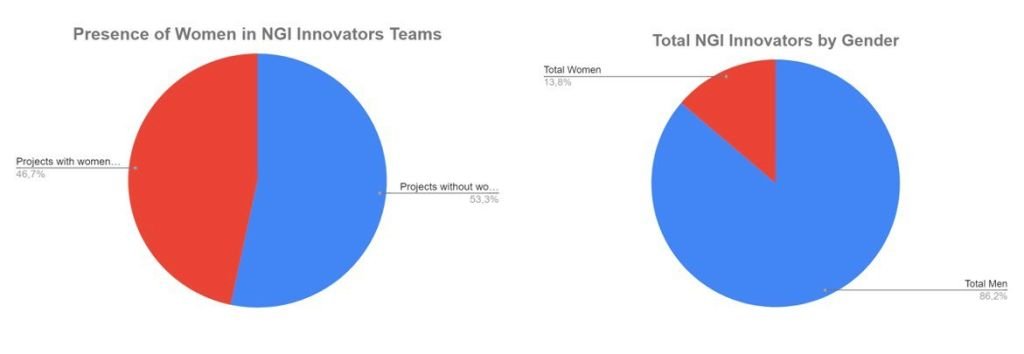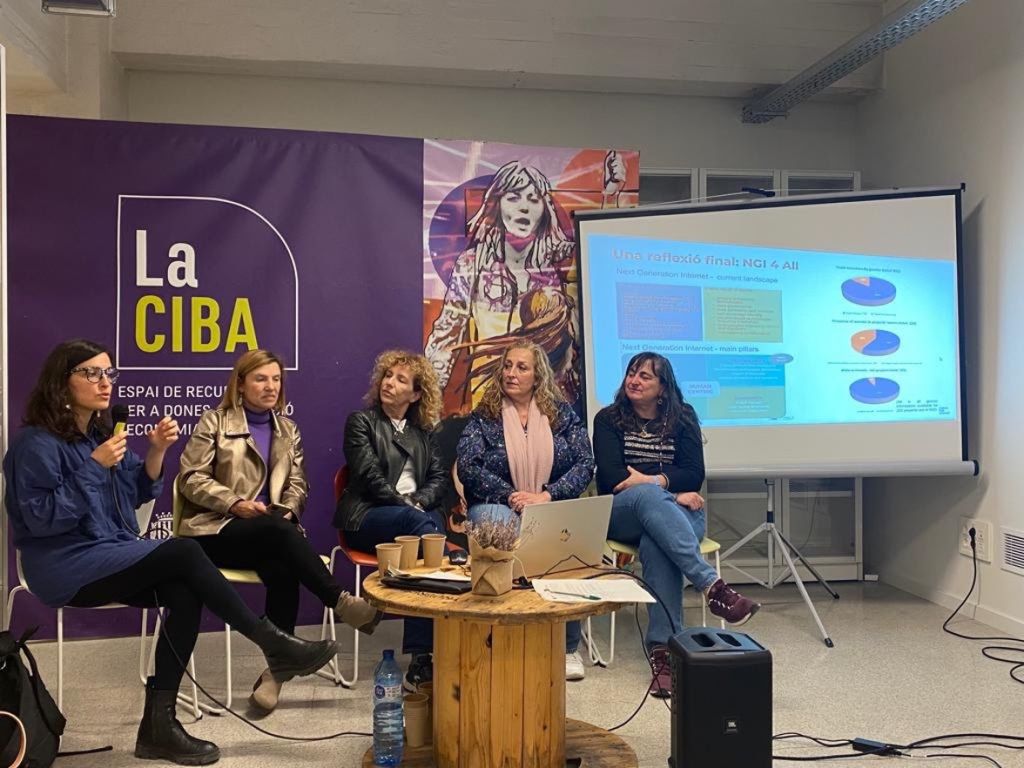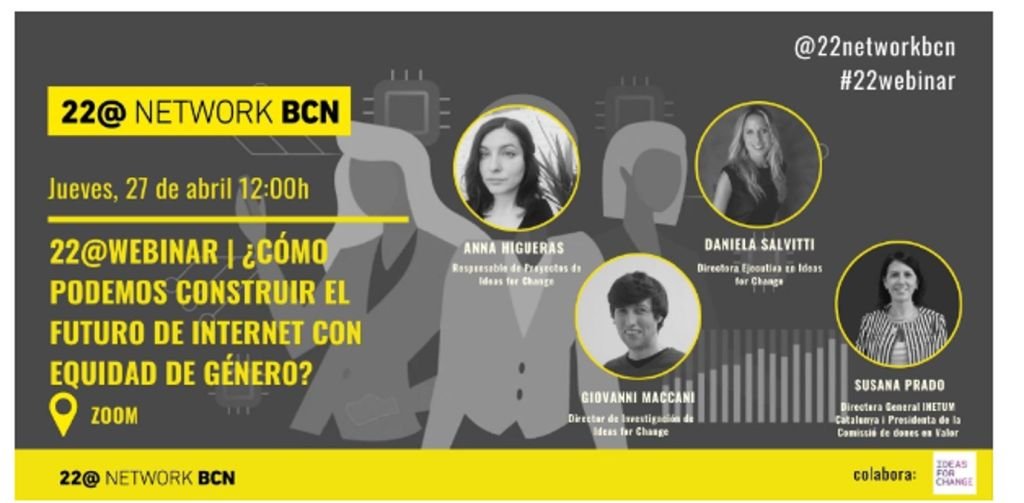The Next Generation Internet is a European Commission funded initiative that facilitates, funds, enables, and promotes the shift towards a safe, human-centric, and inclusive internet through the development of digital commons. As part of this journey, NGI is committed to addressing the current gender gap that exists in open source, and more generally within the software development landscape. While celebrating International Women’s Day, we share in this post some of the work being carried out to address these issues as part of a wider effort to promote equity, diversity and inclusion across all elements of the NGI ecosystem.

In current times, within the open source world, women appear to be largely underrepresented in terms of contributions and participation. To cite some examples, according to the existing literature, women make up only 2.3% of contributors to the Linux kernel[1], and only 4% of open source contributors to GitHub identify as women[2].
NGI, through its focus on equity, diversity and inclusion, is paving the way to address these fundamental issues. For example, from a sample of 200 out of 1000 NGI teams of innovators funded by the programme, 13.8% of individuals describe themselves as female, and women appear to be present in 46.7% of the teams surveyed.

It is evident that the NGI initiative has achieved greater gender diversity compared to the broader open source ecosystem. However, efforts to attain gender balance and equality in this field are still significantly lacking.
In this complex and multifaceted journey, NGI4All.e is committed to further understanding and addressing these challenges. The goal of these endeavors is twofold:
First, through interviews with women innovators worldwide, and through an in-depth analysis of their experiences, several issues, barriers and challenges are being uncovered. It is important to note that the topics collected represent the experiences and opinions of the women interviewed, and are expressed in no specific order of importance or urgency. Examples of themes emerged so far include:
- Gender bias: From a young age, typically around 6 years old[3], women face the first barrier that can have a significant impact on their future careers in tech-related disciplines. Gender bias refers to: “prejudiced actions or thoughts based on the gender-based perception that women are not equal to men in rights and dignity[4].” It is often present in both scholar and family contexts.
- Lack of role models: As also identified in the Women and Minority students in STEM fields[5], many women point towards the importance of having role models who inspired their career paths, roles often assumed by men. Given the historical underrepresentation of women in tech, this lack of visibility creates barriers for women to be inspired, making them in turn less likely tech paths as part of their careers.
- Human-centric vs Profit-centric system: Existing literature suggests that gender differences in interests are influenced by a combination of social, cultural and biological factors.[6] While it is essential to avoid overgeneralizations, studies indicate that on average, women identify more with social value creation than with economic goals, whereas men are more strongly motivated by economic-related objectives.[7]
- Work-life balance: The historical disparity in the caring sector (such as maternity and elder care) is still highly relevant today. The NGI project context is no exception and work-life balance complexities are key, with women’s time constraints hindering leadership roles[8] due to caring and domestic labor responsibilities. Despite holding 26.7% of tech jobs as of 2023[9], barriers to leadership persist across all fields. Addressing these challenges requires societal shifts and public policy changes, highlighting an issue that transcends the NGI program and demands wide-ranging policy solutions.
- Self-Trust and Self-Demanding characters: Gender bias can be manifested in women developing self-demanding tendencies and may translate into a lack of trust in themselves. This behavior may contribute to the reluctance of women to consider applying for leadership roles, driven by: “Who am I to take on this role?[10]“.
- Visualizing Women’s words and work: Addressing gender bias involves strategically highlighting women’s achievements in tech, enhancing their visibility to inspire more women and balance the shortage of female role models. It is crucial to acknowledge women’s contributions based on merit, not gender. The active promotion of women’s voices in the NGI field underscores the need for change and serves as a catalyst for transformation.
- Empower the presence of Academic and Recently Graduated Women in Mentoring programs: Prioritizing young women and recent graduates in academia is key to transformative change in tech, emphasizing the importance of diversifying mentorship and inspiration sources. This can increase women’s participation in tech, shaping a more inclusive future.
- Collaboration Over Isolation: Creating a more equitable tech future requires a community approach, with support from both women and men, focusing on collaboration rather than separate initiatives. Emphasizing organic gender collaboration, the aim is to strengthen women’s communities and their participation for collective success.
- Accessibility: Improving Women’s Lives in the Digital World: Enhancing women’s roles in NGI and tech careers also relies on ensuring their widespread internet access. The digital realm offers a platform to close the gender bias gap through online communities that support women’s visibility, networking, and mentorship. Initiatives providing skills and funding are crucial. Secure, open internet access in Europe and worldwide is essential to empower women to surpass obstacles and seize tech opportunities[11].

From these, NGI4ALL.e is exploring how the overall NGI program can address these barriers. Ideas and plans being explored include: (1) Ensure a balanced participation of women in the evaluation committees for NGI Open-Calls; (2) Foster the participation of women as part of the mentoring programs for innovators in NGI; (3) Foster and improve visibility of open source projects led by women within the NGI to serve as inspiration for others, thus creating the strongly advocated role models from the NGI program; (4) Create specific categories within NGI Open-Calls that prioritize addressing the issue of gender bias present on the internet; (5) Facilitate conciliation mechanisms for family when attending local or international NGI events or mentoring sessions.
Second, in terms of actions, NGI4ALL.e is carrying out Women in Tech Mentoring Sessions, as part of the NGI events dedicated to presenting NGI opportunities and principles to groups of women innovators globally, while exploring opportunities for them to actively engage across its activities. Examples so far include the Data Feminism Day carried out in La Ciba (Santa Coloma) and the online webinar developer for the women entrepreneur community of the 22@ Network.

As we celebrate International Women’s Day, NGI showcases its dedication to creating a more inclusive internet by addressing structural inequalities, and with a special effort to tackle the gender gap in tech and open source. Through initiatives like mentorship sessions and targeted actions aimed at enhancing visibility and collaboration, NGI is making its humble contribution to promoting equity, diversity, and inclusion within the digital ecosystem. The effort is ongoing, so make sure you stay posted to get further insights on how NGI is contributing to a more equitable future in the digital age.
[1] Linux Foundation Annual Report 2020: https://www.linuxfoundation.org/resources/publications/linux-foundation-annual-report-2020
[2] GitHub survey: https://octoverse.github.com/2021/
[3] Gender stereotypes about intellectual ability emerge early and influence children’s interests. (Science, 2017): https://www.science.org/doi/10.1126/science.aah6524
[4] Meaning Gender Bias (Eige Europa, 2010): https://eige.europa.eu/publications-resources/thesaurus/terms/1320?language_content_entity=en
[5] Factors Contributing to the Underrepresentation of Women and Minority Students in STEM Fields. Sage Science Review of Educational Technology (SSRET) 2023: https://journals.sagescience.org/index.php/ssret/article/view/58
[6] Gender differences in social interactions. (Science Direct, 2021): https://www.sciencedirect.com/science/article/pii/S0167268121001104
[7] Gender differences in Social Entrepreneurship: Evidence from Spain (Women’s Studies International Forum, 2023): https://www.sciencedirect.com/science/article/pii/S0277539522001042#bb0205
[8] Work-Life balance for women STEM leadership (Krystal L. Brue, Ph.D. Cameron University, 2019): https://journalofleadershiped.org/wp-content/uploads/2019/04/18_2_brue.pdf
[9] 70+ Women In Technology Statistics (2024): https://explodingtopics.com/blog/women-in-tech
[10] Research conducted by Paola Zanchetta in 2023 for the Round Table about: Barriers and Opportunities of women in STEM, organized by Wikifactory and the EU project Critical Making: https://sedate-garment-a9b.notion.site/Women-in-STEM-Research-Wikifactory-Critical-Making-23th-March-Roundtable-a6c156be8e724e10972c2be577f66e93
[11] Why internet shutdowns are even worse for women (Access Now, 2023): https://www.accessnow.org/internet-shutdowns-international-womens-day/

